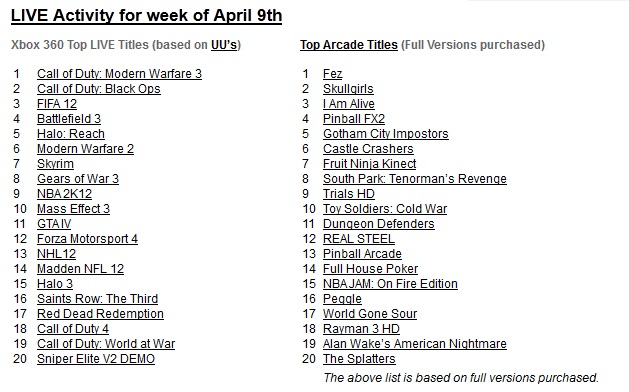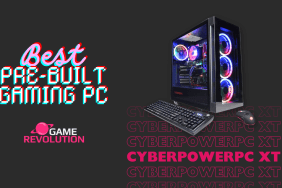Much has been said about the widening income gap between the rich and the poor in the United States. As the economy has slowed, many small business owners have lost a large portion of their income and they can't afford their mortgages. Many retirees who counted on their stock market and real estate investments have rejoined the workforce to make ends meet. The middle class is shrinking, and while the comparison is not exactly on even ground, middle class video games are too.
The shrinking state of B-tier video games isn't a particularly surprising on when given the attention span of gamers nowadays. It seems we only have time for two kinds of games: those made for short bursts and those made for long investments. The first type is firmly aligned with the arcade mindset and those well-suited for smaller or independent studios that release games in mainly downloadable platforms, via Xbox Live, PlayStation Network, Steam, and mobile phones. The second kind are either lengthy adventures with well-developed stories and characters (mainly single-player) or with recurring matches with other players online (mainly multiplayer). But the games that come between them on the store rack—Eat Lead, Hunted: Demon's Forge, Singularity, Test Drive Unlimited, Binary Domain, NeverDead, Enslaved—hardly get noticed and are not as well-supported.
Developers also see the profitability of choosing either extreme, instead of going with a game concept that's somewhere in the middle. It's about dreaming big, really. Titles like Angry Birds and Temple Run don't cost much to produce and don't cost much to consumers; combine that with a mobile phone that players have at their fingertips at all times, and a potential megahit is born. On the flipside are triple-A titles that cost a mind-boggling amount of money to develop and cost upwards of $60 for consumers (usually much more with paid DLC, monthly or annual subscriptions, and Collector's Editions). Executed well, they rake in money hand over fist.
These two types of titles are seen as the holy grails of video game success, as the foundations necessary to create healthy publishers, developers, and consoles. In fact, all the B-titles are usually created in pursuit of creating (or stumbling upon) a formula that will work for a triple-A franchise, one that can be built upon iteratively in sequels and off-shoots – Call of Duty, Halo, Assassin's Creed, Madden, Sims, Mario, Zelda, Street Fighter, World of Warcraft, and Final Fantasy. (Well, maybe not that last one as much anymore.) Once a developer finds that special triple-A franchise, it will give them the safety net they need to produce riskier B-titles, or new IPs for the retail market.

During financially difficult and highly competitive times, however, it's only natural for publishers and developers to focus their efforts on their leading franchises instead of gambling on a new IP that will likely not pay off. Developer Midway in 2007, in a feature on LevelUp called "What Devs Can Do", echoed this sentiment:
According to our numbers, the actual success rate of new IP over the past four years is just seven percent. In other words, 93 percent of new IP fails in the marketplace. So while the 90-plus review scores and armfuls of awards create the perception that titles like Psychonauts, Shadow of the Colossus, Okami and other great pieces of work were big successes, the truth is that they were big financial disappointments and money losers.
Talk about discouraging. While consumers and critics may believe that an innovative title is the key to success, many times they just don't break even. New IP B-titles already have trouble getting off the ground because they have little or no name recognition. Couple that with the cost of distribution, production, and marketing on the retail market, and the chances that the developers will see a profit is against them. This is in small part why the most innovative titles are now in the downloadable space, where the post-production costs are much lower and distribution is much simpler and faster.
Now, this isn't to say that the value of B-titles have been dismissed. Third-party studios who don't already have a triple-A franchise will continue to produce B-titles in their pursuit of having one… or fail trying. Some B-titles can also find a niche market and excel enough at their specific genre—fighting, JRPGs, point-and-click adventure—to be profitable. (I'm looking at you, Demon's Souls.)

However, until the economy turns around and publishers like Sony, THQ, and Nintendo can get themselves out of the red, we will continue to see fewer risks from leading publishers. While they understand the value and necessity of developing new ideas, that has become more fitting for the domain of the more bite-sized downloadable market.
With triple-A titles dominating the retail sales charts and small downloadable titles dominating the XBLA, PSN, and mobile sales charts (just look at the Xbox LIVE activity posted by Major Nelson, picture above), the ability of B-titles to gain recognition from the press and play time from consumers is now tougher than ever. They now need high review scores as well as triple-A production value just to compete, and that's a gamble many publishers are not willing to take or simply don't have the money to take.
B-titles may not become extinct, but they are an endangered species. Only time will tell if we care to save them.











